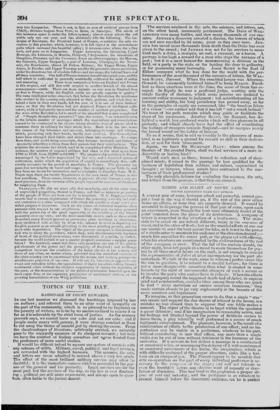RATIONALE OF COURT REWARDS.
TOPICS OF THE DAY.
IN our last number we discussed the hardships imposed by law on authors ; and referred them to an utter want of sympathy on the part of the community, which is so pleased to be facetious on the poverty of writers, as to be by no means inclined to relieve it so far as it is relievable by the strict boon of justice. As the nursery proverb says, we cannot have our cake and eat our cake : and if people make merry with penury, it were strange conduct in them to cut away the theme of ancient jest by abating the cause. From the disadvantages of literature, arbitrarily created, we naturally pass to the niggardly measure of its cheapest rewards ; but here we have the comfort of finding ourselves not verse treated than the professors of more useful studies. It would be difficult indeed to square our system of rewards with any scheme of utility. Military, naval, political, and legal services, are rewarded with the highest honours. The sciences, the arts, and letters are never admitted to reward above a very low grade. The effect of the most brilliant military service may often be doubtful : it is the immediate success which is rewarded in the per- son of the general and his posterity. Legal services are for the most part but the services of the day, as the law is ever fluctuat- ing political are still more evanescent, and always open to ques- tion, often liable to the justest dissent The services rendered in the arts, the sciences, and letters, are, on the other hand, necessarily permanent. The Duke of WEL.. LINGTON won many battles, and slew many thousands of our ene- mies. JENNER'S discovery arrested a disease, the terrors of which are not now recalled by its name, great as they once were. JEN- NER has saved more thousands from death than the Duke has ever given to the sword ; but JENNER was not for his services to man- kind made a duke, a marquis, an earl, a viscount, or a baron. A peerage is too high a reward for a man who stays the ravages of a pest ; but it is a meet honour for manceuvering a division in the field, or a party in the state, or for holding the door to gallantry, or for possessing many boroughs. JOHN SCOTT is the Earl of Eldon: compare what he has done for the world with the per- formances of the most favoured of the servants of letters, Sir WAL- TER Scow, Baronet. When the ennobled lawyer was Attorney- General, he vehemently bestirred himself to hang HARDY. Excel- lent as these exertions were at the time, the sense of them has es- caped. In Equity he was a profound judge, wanting only the single faculty of decision, which some persons are inclined to account rather necessary to judgment ; but notwithstanding all his learning and ability, his long presidency has passed away, so far as the principles of equity are concerned, like " the baseless fabric of a vision "—we cannot add that it has left " not a wreck behind." No trace of his path remains which may Ode or facilitate the steps of his successors. Another SCOTT, the Baronet, has de- lighted a world, has produced works which will give pleasure to all posterity, and which already have had the effect of conciliating the feelings of strangers towards England—and he occupies nearly the lowest round on the ladder of honour.
To its it seems, that to add so lavishly to the pleasures of man- kind, is as legitimate a ground for reward as skill in their destruc- tion, or zeal for their lebasement Again, we have Sir HUMPHRY DAVY: where among the throngs of the created Peers, shall we find services of a more in- disputable or lasting kind ? Would such men as these, trained to reflection and of disci- plined minds, if raised to the peerage be less qualified for the business of legislation than soldiers and sailors, unpractised in thought ; or lawyers, whose minds have contracted to the nar- rowness of their professional studies ?
The only plausible defence for excluding the sciences, the arts, and letters from the peerage, is that they are above it.


















 Previous page
Previous page